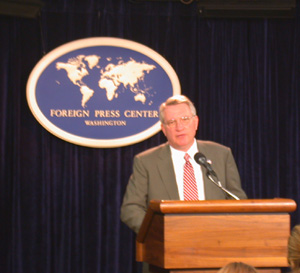AMSTERDAM, Netherlands (AP) -- Faced with massive smuggling of Ecstasy, a U.S. official said Friday the Dutch government needs to give authorities the power to use wiretaps and infiltrate criminal gangs to crack down on its production. U.S. drug czar says Dutch
must get tough on Ecstasy
John Walters, director of the White
House Office of National Drug Control PolicyThe Dutch government "isn't serious enough" about closing down laboratories that ship tons of synthetic drugs to the United States, said John Walters, director of the White House Office of National Drug Control Policy. Walters, attending a conference in Rome, spoke by telephone with The Associated Press. The Netherlands is seen as the largest source of Ecstasy for the United States and the rest of the world.
Speaking to reporters in Rome on Friday, Walters also took European countries to task for their lax punishment of marijuana use, calling their policies "fundamentally irrational."
Some officials in Europe are "very vocal about their view that it's an appropriate policy to be more free about allowing drug use," said Walters. This is "a fundamentally irrational health policy and social policy," he said, insisting that they created a new generation of drug addicts.
Many European countries follow a policy of therapy instead of punishment for possession of drugs for personal use, with prison a last resort for drug users. Dutch authorities have legalized marijuana and concentrated police efforts on hard drugs.
The Dutch insist they have pulled out all the stops against Ecstacy. But Walters' comments reflect U.S. frustration at the continuing flow of synthetic drugs from the Netherlands and Dutch reticence to employ the toughest tactics in the war on drugs.
Last year, the 230-member Synthetic Drugs Unit, set up in 1998, uncovered 43 production facilities, seized more than 6 million Ecstasy pills and confiscated enough chemicals to make another 127 million pills.
But Walters called those figures misleading and was critical of the Dutch for failing to give police greater authority to move against drug gangs. The Dutch have been reluctant to enact laws that could be seen as infringing on civil liberties.
"The reason you have more seizures and arrests is that the business is growing faster than the containment of that business," Walters told the AP. "We have had some improved cooperation, especially with Dutch law enforcement, but there simply have not been adequate steps taken by the government of the Netherlands to control this," Walters said.
"There is a limited ability to use wiretap and informant information that makes it harder when you have a criminal conspiracy to enforce laws," he said. "If the Dutch government would take this seriously and take the steps necessary, this would change dramatically," he said.
The fact that it hasn't is a failure to take the necessary steps and persuade the people of the Netherlands that this is a priority," he said.
Martin Witteveen, the lead Dutch prosecutor for synthetic-drug crimes, said the criticism was not justified. "There has been an enormous effort and we have seen a lot of results in the past year," he said.
Witteveen acknowledged he has limits on using undercover agents. "I have repeatedly said it would be useful to use informants, but I have to work within the law."
HOMERefs
Dutch XTC
Professor X
Charles Grob
Global Ecstasy
Zeev Rosenstein
Canadian Ecstasy
Ecstasy in the USA
Paramilitary Ecstasy
Ecstasy and the Brain
Utopian Pharmacology
MDMA/ecstasy: review
The Michelle Leslie Case
Alexander Shulgin Interview
PULP: Sorted for E's and Whizz
Total Synthesis author sentenced
Buying Research Chemicals Online

